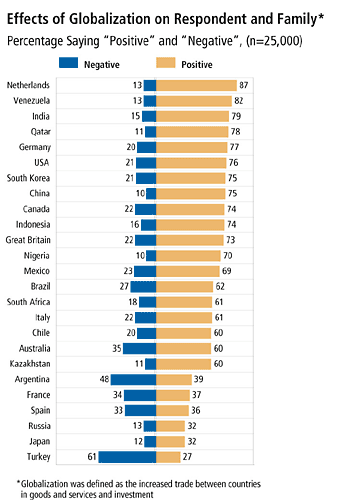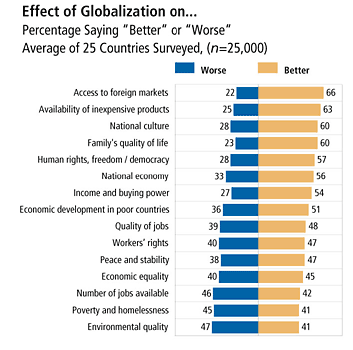Friday 1 February 2002
Contact:
| World Economic Forum Charles McLean, Director Communications and Public Affairs E-mail: public.affairs@weforum.org |
|
Environics International Ltd Doug Miller President doug.miller@EnvironicsInternational.com |
Favor Globalization but Worry about
Jobs, Poverty andEnvironment
World Economic Forum Survey of 25,000 Citizens across 25Countries
New York, 1 February 2002 - The largest-ever public opinion poll onglobalization, covering countries with 67 percent of the world's population,shows that people increasingly favor economic globalization, but they have highexpectations in some areas that will be difficult to satisfy. Citizens also haveconcerns about what they see as the damaging impacts of globalization.
Conducted in late 2001 as part of the first comprehensive global survey of thepost-September 11 world, the research reveals that:
• Majorities of people in most countries surveyed expect that more economicglobalization will be positive for themselves and their families. Across theworld, over six in ten citizens see globalization as beneficial, while one infive see it as negative.
• Positive views of globalization have grownover the past year, especially in North America and Europe.
• Citizens,especially those in poorer countries, have high expectations that globalizationwill deliver benefits in a number of economic and non-economic areas.
•However, citizens also believe that globalization will worsen environmentalproblems and poverty in the world, and reduce the number of jobs in theircountry.
• Especially in G7 countries, most citizens do not believe thatpoor countries benefit as much as rich countries from free trade andglobalization. However, the opposite is true in low GDP countries.
The World Economic Forum poll involved 25,000 in-person or telephone interviewsacross mainly "Group of 20" countries, and was conducted between October andDecember 2001 by respected research institutes in each participating countryunder the leadership of Environics International Ltd. of Toronto, Canada. (Pleasesee page 5 for a list of field dates by country and participating researchinstitutes).
Majorities of people in 19 of 25 countries surveyed expect that more economicglobalization will be positive for themselves and their families. While over sixin ten citizens worldwide (62 percent) see globalization as positive, only one inseven are convinced of this. Globalization's strongest supporters are found innorthern Europe, North America, and poorer countries in Asia. Conversely, one infive citizens (22 percent) believe that globalization has negative effects onthem personally. Most opposed to globalization, and increasingly so, are peoplein economically troubled Turkey and Argentina. The accompanying chart providescountry-specific findings.

Over the past year, positive views of globalization have grown, especially inNorth America and Europe. Of the 18 countries where the question was asked inboth 2000 and 2001, positive views are up significantly in nine (most notably inGermany and South Korea), and down in five (especially in Turkey).
People generally have high expectations from economic globalization. Majoritiesanticipate improvements on eight of 15 factors surveyed, most notably greateraccess to world markets, cheaper goods, improved cultural life, a better qualityof life, strengthened human rights, a more robust national economy, and a higherpersonal income.

However, significant proportions of people across the world are concerned thatglobalization will have a detrimental impact in a number of other areas, mostnotably environmental quality, poverty and the number of jobs available, but alsothe gap between rich and poor, world peace and stability, workers' rights, andthe quality of jobs. The biggest concern is environment, with majorities ofpeople in ten countries, including much of Europe, foreseeing environmentaldegradation resulting from increased globalization.
Citizens do not believe that poor countries benefit as much as rich countriesfrom free trade and globalization. Almost one in two citizens across the 25countries surveyed disagree with the statement that "globalization benefits poorcountries as much as rich countries." This view is especially pronounced in G7countries where six in ten disagree, a finding that corroborates the contentionof many activist groups and critics of globalization. However, in the low GDPcountries surveyed, most citizens agree that poor countries benefitequally.
There remains significant support for peaceful anti-globalization protesters.Almost one in two citizens overall and majorities in half of the 25 countriessurveyed "support people who take part in peaceful demonstrations againstglobalization because they are supporting my interests." Support in the UnitedStates is somewhat muted (four in ten), down ten points from just prior toSeptember 11.
In commenting on the poll's findings, Charles McLean, Director of Communicationsat the World Economic Forum said, "Both sides of the globalization debate willfind things to welcome and to be concerned about in these research results. Forour part, the Forum is pleased to have brought the views of average citizens fromaround the world into the debate." He went on to say, "The Forum's members shouldsee this survey as evidence of growing appreciation of globalization's benefits.However, they should also see this as a time of considerable challenge and greatexpectations on the part of the public."
Richard Samans, Director of Global Issues at the World Economic Forum, said, "Thepublic is still coming to judgement on important aspects of globalization. Whilethe globalization agenda has advanced its popular mandate over the past year,this research suggests it faces a number of tough challenges. Fortunately, thisyear's international agenda, including important UN conferences in Monterrey,Mexico and Johannesburg, South Africa, as well as the "Group of Eight" Summit inCanada, presents leaders with excellent opportunities to tackle the most pressingissues - poverty, job growth, market access, and environmental protection. Majorcommitments and actions in these areas will be needed to solidify public supportfor global integration."
According to Doug Miller, President of Environics International, "In thispost-September 11th world, citizens in the richest countries feel new urgency toensure that those in the poorest countries gain some tangible advantage fromglobalization. Society may be at an historic moment when the importance ofaddressing global poverty is matched by the self-interest, the willingness andthe capacity to do so. Companies need to be part of this. Our research shows thatconsumers expect global companies to be part of implementing global solutions inthe social and environmental realms, as well as the economic sphere. By playingactive, yet appropriate, roles in addressing world problems, global companies canhelp reduce distrust of their motives, gain important brand equity, and helpsolidify positive views of globalization."
Each national survey was based on a representative sample of about 1,000 adultsand was conducted in- home or by telephone between October and December 2001 aspart of Environics' annual 25-nation Global Issues Monitor survey. Nationalfindings are accurate to within + or - 3 percent, 19 times out of 20.
TheWorld Economic Forum
Environics' Public Opinion Research
| COUNTRY | | start-close | |
| Argentina | LatinaResearch CADMO | Buenos Aires | Oct. 8—Nov.12, 2001 |
| Australia | TNS Australia | Sydney | |
| Indicator | Sao Paulo | | |
| Canada | Montreal | Nov. 5—11, 2001 | Chile | Santiago | Nov. 10—23, 2001 | China | Survey &Statistics Institute of BBI | Beijing | |
| CSA-TMO Group | Paris | | |
| Germany | Teningen | Oct. 19—Nov. 11, 2001 | Great Britain | London | Oct. 22—Nov. 14, 2001 | India | ORG-MARGResearch Limited | Mumbai |
| Indonesia | DekaMarketing Research | Jakarta | Oct.17—Nov. 7, 2001 |
| Eurisko SpA | Milan | | |
| Nippon Research | Tokyo | | |
| Kazakhstan | Almaty | ||
| Mexico | MundAmericas | Mexico | |
| Netherlands | Motivaction | Amsterdam | |
| Market Trends Research International, NigeriaLtd. | Lagos | Oct. 24—30 Nov.10—15, 2001 | |
| CESSI Institute for Comparative Social Research | Moscow | Nov. 14—29, 2001 | |
| Qatar | MEMRB-QATAR | Doha | |
| South Africa | Randburg | Oct. 15—Nov. 15, 2001 | South Korea | Seoul | Oct. 20—Nov. 5, 2001 | Spain | Quota Union(Grupo Sigma Dos) | Madrid | Oct.31—Nov. 22, 2001 |
| Turkey | Yontem Research & Consultancy | Istanbul | Oct. 5—30, 2001 | USA | ComQUESTReseach | Montreal |
| Venezuela | Sigma DosVenezuela | Caracas |